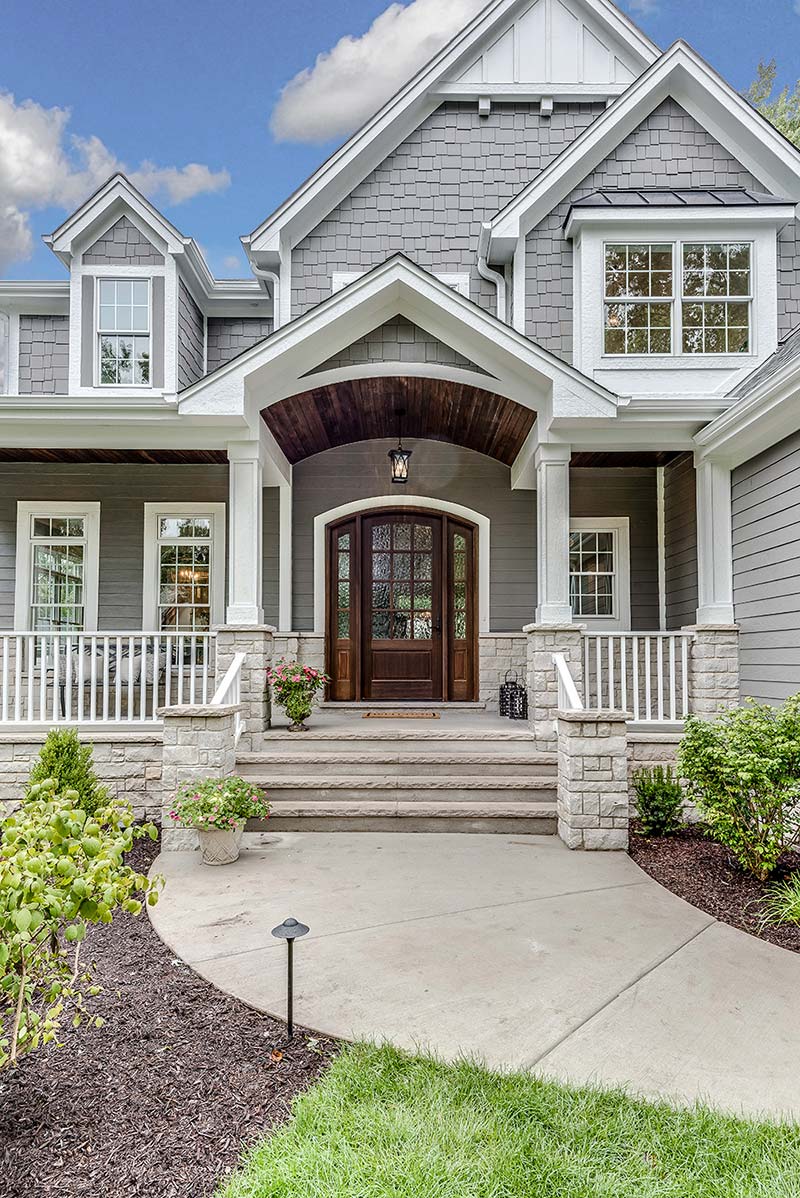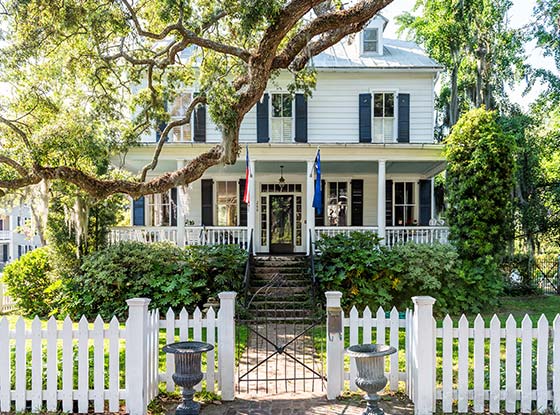Few purchases give you a sense of pride and accomplishment like buying a new home. From white picket fences and lush green grass to cookouts with neighbors and holidays with the family, owning a home is magical. Like most great things, though, enduring the home-buying process takes a lot of work. There are many steps to take and difficult decisions to make along the way. One of the most crucial decisions is what type of home loan and mortgage broker to choose. Whether it's your first time buying a home or you're a seasoned owner with multiple properties, you will need a trusted mortgage broker in Johns Island, SC, with your best interests at heart.
If you're like most people, you need a mortgage professional whose top priority is their customers - an expert who can provide accurate advice and guidance so you can make educated decisions. That's where Mission One Mortgage comes into the picture.
DifferenceThe Mission One Mortgage Difference

Whether you want the best interest rates or don't know where to start in the home-buying process, Mission One Mortgage can set you up in the right direction. From getting you pre-qualified to buy a home to securing a veteran's loan, Mission One Mortgage is the trusted solution you need. As Johns Island natives, we're proud to serve the Lowcountry and all of South Carolina with trusted mortgage brokerage services.
Unlike some mortgage companies in Johns Island, SC, we bring years of high-level experience and insight to the table. Having worked with hundreds of clients during our time in business, we know you're probably going through a range of emotions right now. Buying a new home can be a scary process, especially for first-time buyers. That's why we make every effort to make ourselves accessible and available for clients. Our primary goal is to help you make the right mortgage for your family and your budget.
Our Services
- Mortgage Broker Johns Island, SC
- The Mission One Mortgage Difference
- Why Should I Work with a Mortgage Broker in Johns Island, SC
- Exploring the Benefits of Working with a Mortgage Broker
- Common Home Loan Options in South Carolina
- Home Mortgage FAQs
- Mission One Mortgage: Turning Dreams into Reality, One Mortgage at a Time
Service Areas
We know that many home loan officers have horrible reputations. Some brokers only see their clients as transactions, and a means to make quick money. They come off as impatient and pushy, failing to understand that this is a very big decision for you. At Mission One Mortgage, we take the opposite approach. We encourage our clients to take as much time as needed to ask us questions and review mortgage documents. We could say that our mission is to exceed your expectations, but we'd rather just show you. From assistance finding FHA, VA, or other loans to refinancing your current mortgage, Mission One is the team you can trust.
Here are just a few reasons why home buyers choose Mission One Mortgage:
Why Should I Work with a Mortgage Broker in Johns Island, SC?

Most people simply don't have access to the hundreds of thousands of dollars needed to purchase a home with cash. Instead, they take out a mortgage loan to buy a home. Unfortunately, many homebuyers are anxious to get the ball rolling and, due to their excitement, fail to shop around for the best mortgage rates. To some degree, avoiding this step makes sense, as it requires a lot of legwork and research to get the job done. For those not wanting to spend hours researching a reasonable mortgage, there's an alternative to consider - working with a mortgage broker.

To understand the benefits of working with a mortgage broker, you must first understand their role in the home-buying process.
What Does a Mortgage Broker Do?
Your mortgage broker is a third party that works to connect you with mortgage lenders. Essentially, a mortgage broker works as an intermediary between a person who wants to buy a home and the entities offering loans to buy a home. The mortgage broker works with both the borrower and lender to get the borrower approved. They also verify and collect paperwork from the borrower that the lender needs to finish a home purchase. Typically, mortgage brokers have relationships with several home loan lenders. Mission One Mortgage, for example, has access to 50 different lenders, which gives us a wide range of home loans in Johns Island, SC, from which to choose.
In addition to finding a home loan lender, your mortgage broker will help you settle on the best loan options and interest rates for your budget. Ideally, your mortgage broker will take a great deal of stress and legwork off your plate while also potentially saving you money.
Help with the Pre-Approval Process
If you're ready to buy a home, getting pre-qualified is a great choice that will streamline the entire process. Your mortgage broker makes getting pre-approved easy by obtaining all the documents needed to get you pre-qualified. In taking a look at your application, they will determine if you're ready for the pre-approval process. If your application needs additional items, the mortgage company will help point you in the right direction to ensure your application is as strong as it can be. Your mortgage broker will also walk you through the different types of loans, from Conventional and FHA to VA and USDA.
In order to be pre-approved for a home in South Carolina, you must have the following:
- Two Years of W2 Forms
- 30 Days of Pay Stubs from Employer
- 60 Days of Bank Statements
- A Valid Driver's License
BenefitsExploring the Benefits of Workingwith a Mortgage Broker

Most people choose to use a mortgage broker because they have access to different lenders and interest rates. But a great mortgage broker brings more to the table than a choice of lenders.
Save You from Unneeded Stress:One of the biggest advantages of hiring a mortgage broker is that they can find and vet loans while managing the mortgage process on your behalf. The best mortgage companies, like Mission One Mortgage, hire brokers who are experts at keeping underwriting on track, coordinating with relevant parties, and handling all paperwork involved. At the end of the day, mortgage brokers save you stress and time and often expedite the closing process.
More Access: We touched on this earlier, but it bears repeating: A mortgage broker provides access to a range of loans, rates, and lenders. In fact, many mortgage brokers can get rates lower than what the average person could get from a lender.
Save You Money: There's a chance that your mortgage broker can get your mortgage fees reduced or waived by the lender, which could save you a good deal of money.
Help with Unfavorable Financial Situations: Expert mortgage brokers can often assist in challenging financial situations, like when a buyer has inconsistent income or less-than-perfect credit. Experienced brokers, like those at Mission One Mortgage, are often aware of lenders willing to will work with nontraditional borrowers.
Provide Key Insights: Mortgage brokers share important insights, such as your chances for a home loan approval and exactly how much house you can afford. They can also save you from making costly mistakes based on their years of expertise in the mortgage industry.

Home LoanCommon Home Loan Options in South Carolina

While settling on the best type of home loan isn't as exciting as searching for the home of your dreams, it's equally important. Yes, your Mission One Mortgage loan officer in Johns Island, SC, will be happy to help explain the differences between home loans. But understanding the basics ahead of time will save you stress and time in the long run.
Contact Us For Service !
Free Consultation (843) 822-5685
(843) 822-5685
Conventional Mortgages
Conventional loans can be used to purchase a new home or refinance your current one. Conventional loans include fixed-rate mortgages and adjustable-rate mortgages. Generally, borrowers must put down a 3% down payment for owner-occupants, 10% for a vacation property, and 20% for an investment home. If you are able to pay 20% of the total cost of the home, you can avoid private mortgage insurance, which is otherwise required. Conventional mortgages are often preferred by buyers with good credit or people needing a non-owner-occupied mortgage.


FHA Loans
FHA mortgages are issued by the U.S. government and backed by the Department of Housing & Urban Development (HUD). This loan is often preferred by first-time homebuyers because it only requires a 3.5% down payment and offers more flexibility with credit requirements and underwriting standards. FHA loans have several requirements you must meet to qualify. Contact Mission One Mortgage today to learn more about FHA loans and whether or not they're best for your financial situation.
USDA Loans
Also backed by the government, these loans are insured by the U.S. Department of Agriculture and don't require money down. These loans have lower insurance requirements when compared to FHA loans, offer 100% financing if you qualify, and allow for closing costs to be covered by the seller. In order to qualify for a USDA loan, you must live in a rural area, and your household income must meet certain standards. These loans are often preferred by low-income citizens who live in rural parts of South Carolina.


Veteran Mortgages
Also known as VA or Veteran's Affairs loans, these mortgages are reserved for the brave men and women who served in the military. VA loans help provide our military members, veterans, and their families with favorable loan terms and an easy home ownership experience. Often, those who qualify are not required to make a down payment on their home. Additionally, these loans often include less expensive closing costs.
If you are a veteran or the family member of a veteran, contact Mission One Mortgage today to speak with our Vetted VA Professional, Debbie Haberny. Debbie helps our military members, veterans, and their family members obtain home loans utilizing veteran benefits and would be happy to help as you search for a home.
FAQsHome Mortgage FAQs

Do you have questions about the complexities of mortgages and home loans? As your advocate, Mission One Mortgage is here to answer any questions you have about mortgages and the home-buying process. We encourage you to call our office to speak directly with one of our mortgage experts or continue reading below for answers to some frequently asked questions.
Q. I was talking to my spouse about mortgage brokers, and they mentioned the phrase home loan originator. What's the difference between a broker and a loan originator?
A. The mortgage industry is full of confusing jobs and titles, making it easy to confuse roles and responsibilities. Such is the case with mortgage brokers and home loan originators. Though their roles share similarities, a home loan originator in Johns Island, SC, works for a bank or credit union, while a mortgage broker works for a brokerage company. Home loan originators and mortgage brokers are both licensed by the Nationwide Multistate Licensing System (NMLS).
Q. I've heard from everyone that you must have mortgage insurance to buy a home. What is mortgage insurance?
A. Essentially, mortgage insurance helps protect lenders if a borrower forecloses on the home they bought. One advantage of mortgage insurance is that when borrowers pay it, lenders can often grant loans to buyers when they might not have otherwise. Though not always required to buy a home, mortgage insurance is often needed for down payments of less than 20%.
Q. I have just been pre-approved to buy a beautiful home in South Carolina. Is there anything I shouldn't do now that I'm pre-qualified?
A. Mortgage companies like Mission One Mortgage, make getting pre-qualified for a home easy. However, as your loan process continues, your lender is required to run a new credit report before closing on a home. For that reason, it's to avoid any activity that might affect your credit score, such as:
- Do not become a co-signer on a loan with someone else.
- Do not quit or change your job.
- Do not apply for new credit cards, automobile loans, or any other lines of credit.
- Do not use your credit card to pay for large purchases, like furniture for your new house.
- Do not avoid payments on current lines of credit, loans, or utility bills.
Q. My brother-in-law recently refinanced his home in South Carolina. What is refinancing, and should I consider refinancing my home too?
A. Refinancing your home basically means you're swapping your current mortgage for a new one, most often with a lower interest rate. If you would like to reduce the term of your loan, lower your monthly mortgage payments, or consolidate debt, refinancing may be a smart option. Many homeowners also choose to refinance if they want to switch from adjustable-rate mortgages to fixed-rate mortgages or to get cash back for home renovations. To learn whether refinancing is a viable option for your situation, contact Mission One Mortgage ASAP, as loan rates change frequently.
Mission One Mortgage: Turning Dreams into Reality, One Mortgage at a Time

Here at Mission One Mortgage, we believe that the best communities begin with the dream of home ownership. Our mission is to make those dreams come true, with personalized service, expert guidance, and good old-fashioned hard work. As one of the most trusted mortgage companies in Johns Island, SC, we have years of experience working with a diverse range of clients, from first-time buyers and investors to self-employed borrowers and non-native English speakers.
Though every mortgage situation is different, one thing never changes: our commitment to clients. Contact our office today to get started on an exceptional home-buying experience.
Contact Us For Service !
 (843) 822-5685
(843) 822-5685

Latest News in Johns Island, SC
New dining venues opening in Mount Pleasant, North Charleston and Summerville
Warren L. Wise wwise@postandcourier.comhttps://www.postandcourier.com/business/retail/north-charleston-restaurant-mount-pleasant-summerville-johns-island-airport-chick-fil-a/article_ff502b2a-9a84-11ee-a8c9-a77bffb02769.html
Three new places to grab a meal on the go or dine in are opening across the Charleston area over the next week or so and another plans to open by the end of January.In Mount Pleasant, a Pawleys Island-based business wants customers literally to “get carried away” over a ...
Three new places to grab a meal on the go or dine in are opening across the Charleston area over the next week or so and another plans to open by the end of January.
In Mount Pleasant, a Pawleys Island-based business wants customers literally to “get carried away” over a dining venue opening soon.
Get Carried Away, with its well-known Palmetto Cheese pimento cheese brand, will roll into the former Wild Wings Cafe space in Moultrie Plaza Shopping Center at 644 Coleman Blvd. tentatively on Jan. 11 with a soft opening, according to owner Brian Henry.
The cafe and market is awaiting one final inspection before it opens, according to David O’Donnell, part of the management staff overseeing final details. Stocking is expected to take place over the weekend.
The outside area, called The Perch, will be open for casual eating and drinking and will offer full service in late winter or early spring.
The site’s prepared to-go food offerings include Lowcountry boils, tomato pies, chicken salad, 18 different casseroles, dips, spreads, appetizers, pies, grab-and-go items, sandwiches, salads, soups, daily specials, steaks, chicken, pork, seafood, bread and everyday grocery items such as milk, eggs, butter and produce, craft beer and wine.
Hours will be 9 a.m.-7 p.m. Monday through Saturday. When The Perch opens with full service, the business will be open until 9 p.m. Henry also is considering opening on Sundays during the summer.
On the way
On Johns Island, a proposed mixed-used development includes dining and shopping venues, office space, residences and a hotel.
Developer New Leaf Builders wants to build three restaurants totaling 8,500 square feet, a 2,450-square-foot retail area, 7,500-square-foot office building, a 55,000-square-foot hotel and 65 residential units at 2935 Maybank Highway in a new development called Jubilee.
The 13.3-acre site sits behind property owned by Church of God of Prophecy and extends to Cane Slash Road. It is near Wildts Battery Boulevard.
The developer is asking the city to review the planned unit development before it is submitted to the Planning Commission.
Landing soon
In North Charleston, the long-awaited Chick-fil-A restaurant at Charleston International Airport will open soon after a monthlong delay from the originally scheduled opening date in early December.
The fast-food venue is set for a soft opening on Jan. 11 before a ribbon-cutting ceremony takes place at 11:30 a.m. Jan. 18 for the official launch.
The new restaurant is unique at CHS because it provides access to ticketed passengers and non-ticketed visitors and airport workers. The main service counter is on the post-security side of the terminal while a service window will be available on the pre-security side in the Central Hall area under the dome.
Now serving
In Nexton near Summerville, Page’s Okra Grill has begun serving to-go items only at its newly built restaurant at 142 Brighton Park Blvd.
The dining room, located near the former food truck site off Rose Drive, is not open yet to the public while employees undergo training, according to the restaurant’s Facebook posting. In-house dining is expected to begin over the next week or so.
With its main operation on Coleman Boulevard in Mount Pleasant, Page’s also has a food truck in Moncks Corner and operates Hushpuppies Seafood Co. on North Main Street in Summerville.
Coming soon
A new hamburger-focused restaurant will open soon in North Charleston.
Smashley’s Burger Bar plans to open in late January at 5401 Netherby Lane, between Urban Nirvana and Accent on Wine off Dorchester Road.
Owners Victor and Ashley Valdivieso, who also have Victor’s Lab food truck, will offer several differently prepared all-beef burgers, chicken items, vegetarian offerings, zucchini chips, fried cauliflower, Latin fries, empanadas and various rice bowls. Beer, seltzers, ciders, soft drinks and tea also will be available.
Hours will be 11 a.m.-2 p.m. and 5 p.m.-9 p.m. Monday through Thursday, until 10 p.m. Friday, and 11 a.m.-10 p.m. Saturday. The restaurant will be closed on Sunday.
What’s cooking?
A bakery that’s been in the works for a couple of years is making its way through the city of Charleston review process again.
Mae’s Sweets With Soul wants to build a single-story building with a drive-thru on a 1.83-acre site at 3919 Savannah Highway, east of Rantowles Creek.
Owner Lillie M. Smalls first presented plans to the city in August 2022. A planning department committee recently considered the proposal but asked that the plans be revised and returned.
Cleaning up
Another new car-cleaning business recently opened in the Charleston area.
Tommy’s Express Car Wash can be found at 3680 Ashley Phosphate Road in North Charleston. One other location is coming to the city near Tanger Outlets, while three will be located in the Summerville area: at 1509 Trolley Road, 1319 N. Main St. and 1581 Central Ave., according to the company’s website.
Johns Island residents react to ‘Northern Pitchfork’ project plan
Meredith Blairhttps://www.live5news.com/2023/11/16/johns-island-residents-react-northern-pitchfork-project-plan/
JOHNS ISLAND, S.C. (WCSC) - Those who live on or travel through Johns Island say they have mixed feelings about a new road designed to connect Maybank Highway to two other roadways.Work is continuing on what is called the Northern Pitchfork, which will connect Maybank Highway to Fenwick Hall Allee and River Road. That work will require lane closures from 9 a.m. ...
JOHNS ISLAND, S.C. (WCSC) - Those who live on or travel through Johns Island say they have mixed feelings about a new road designed to connect Maybank Highway to two other roadways.
Work is continuing on what is called the Northern Pitchfork, which will connect Maybank Highway to Fenwick Hall Allee and River Road. That work will require lane closures from 9 a.m. to 2 p.m. on Friday on Maybank Highway at River Road.
Some residents are hopeful it can be part of a solution for what they say is horrendous traffic but others say it’s just a Band-Aid on a bullet wound.
There is also frustration surrounding the daytime lane closures for Friday, as residents believe it will be a nightmare, and the work should be done overnight instead.
Charleston County Construction Project Manager Sheila Parker said this has to get done in a specific window of time and they don’t want project delays. The new road is something the city and county have been working on bringing to life for years, with the goal of alleviating congestion and moving traffic along on the island.
“People coming off of James Island onto Johns Island using the Maybank Highway corridor will be able to take the Northern Pitchfork road and kind of bypass the Maybank Highway and River Road traffic light,” Parker explained
Byhira Thorn, who frequents the island often, said she thinks the new road will cause confusion for drivers, and it’s not addressing the root issue.
“I think another lane in general needs to be added,” Thorn said. “I mean, they did it with the bridge which was awesome, but they need to do it with the island. The island itself all around, roads need to be doubled for sure.”
Johns Island resident Kristin Nolan said she hopes this will help, but wishes it was done sooner.
“First of all, I think they should have thought about this before all of the building that went on and the extra light that was put here,” Nolan said. “I feel bad for people that go to James Island in the morning if Maybank and River are backed up for miles.”
Earlier this month, Charleston leaders said they are working on a $30-million project to improve traffic on Johns Island, part of which includes widening Maybank Highway to four lanes from River Road to the Stono River Bridge. But funding for that has yet to be nailed down and those plans are years away.
The construction on Friday is weather-dependent and drivers are asked to use caution while driving through the area.
Copyright 2023 WCSC. All rights reserved.
Charleston leaders plan $30M project to improve Johns Island traffic
Steven Ardaryhttps://www.live5news.com/2023/11/02/watch-live-city-charleston-officials-address-johns-island-traffic-improvements/
CHARLESTON, S.C. (WCSC) - Officials with the city of Charleston and Charleston County have announced a plan to address traffic concerns on Johns Island.Charleston Mayor John Tecklenburg said the plan is the result of collaboration between the city of Charleston and Charleston County and will tackle traffic flow problems at the intersection of Maybank Highway and River Road, portions of Maybank Highway and the northern and southern Pitchforks, Tecklenburg said.“Traffic congestion has been a huge issue coming and going on J...
CHARLESTON, S.C. (WCSC) - Officials with the city of Charleston and Charleston County have announced a plan to address traffic concerns on Johns Island.
Charleston Mayor John Tecklenburg said the plan is the result of collaboration between the city of Charleston and Charleston County and will tackle traffic flow problems at the intersection of Maybank Highway and River Road, portions of Maybank Highway and the northern and southern Pitchforks, Tecklenburg said.
“Traffic congestion has been a huge issue coming and going on Johns Island,” he said. “And it was accentuated when that traffic light got added down the street. And everyone came to the realization that we needed to go back and rethink what got done six or seven years ago, what’s been done since then and what can we do collectively and collaboratively to make it better and make improvements.”
The city and county laid out the main points of the plan:
“Pitchforks” means two new roads that will branch off of Maybank towards River.
“The current cost estimate sits somewhere between $25 and $30 million to do all of this,” Charleston County Councilmember Joe Boykin said.
Tecklenburg said the money will come from future sales tax and Department of Transportation funding and once permitted, will apply for federal funding.
The full construction funding will have to be identified and approved by both city and county councils, according to Tecklenburg.
The first goal for short-term, interim improvements to Maybank Highway are expected to be complete in the first quarter of 2024, Tecklenburg said.
Robby Lingenfelter who works on Johns Island said he’s hopeful about the project but still frustrated.
“They say that the northern pitchfork will be completed by the first quarter of 2024, that’s good,” he said. “Southern pitchfork they said will take years, so we’re still five to ten years from alleviating the issues we have now.”
He said the city and county have been meeting since June to address the traffic issues on Johns Island.
“It’s going to happen. We are committed to making that happen,” Tecklenburg said.
Some locals question the mayor’s timing.
“Hearing this press conference that is happening five days before an election, can’t help but notice that a lot of this was conceptual and funding for a lot of this isn’t even secured,” Logan Mcvey said. “So, this seems like more talk and a lot more traffic just sitting and waiting on stuff to happen.”
Tecklenburg’s response was that they needed enough vetting through engineers and design teams before the plans could be presented.
Charleston County Council member Jenny Huneycutt, Charleston City Council member Karl Brady and the city’s planning and traffic directors also attended the news conference.
WATCH THE CHARLESTON LEADERS ANNOUNCE THE JOHNS ISLAND TRAFFIC IMPROVEMENT PLAN BELOW
This is a developing story. Check back for updates.
Copyright 2023 WCSC. All rights reserved.
Debate surrounds proposed Johns Island medical village
Emily Johnsonhttps://www.live5news.com/2023/12/13/debate-surrounds-proposed-johns-island-medical-village/
JOHNS ISLAND, S.C. (WCSC) - Charleston County held a public hearing Tuesday night to discuss and hear from anyone interested in the development of a large medical village on Johns Island.The planned development, located between 4357 and 4365 Betsy Kerrison Parkway, called the Island Park Medical Village would take up more than 17 acres.The medical village has been a topic among residents of the islands for months now with polarizing opinions supporting and against the development.More than 30 people spoke during public c...
JOHNS ISLAND, S.C. (WCSC) - Charleston County held a public hearing Tuesday night to discuss and hear from anyone interested in the development of a large medical village on Johns Island.
The planned development, located between 4357 and 4365 Betsy Kerrison Parkway, called the Island Park Medical Village would take up more than 17 acres.
The medical village has been a topic among residents of the islands for months now with polarizing opinions supporting and against the development.
More than 30 people spoke during public comment and hundreds of letters were sent to the council in opposition.
RELATED: Neighbor worried about proposed development on Johns Island
Developers are requesting to rezone the land from low-density residential to large-scale medical office park with almost 160,000 maximum square feet of business space.
The medical village was proposed to Charleston County Planning Commission Members back on November 13 with all 7 members denying the zoning request.
Tuesday night, the questions raised included what types of medical options and concerns about traffic.
“We do agree that we need medical facilities, that we do need access,” Long-time Johns Island Resident, Tamara Butler, says. “My question is just what kinds of medical facilities are going to be there and what services are going to be provided.”
Almost 900 property owners on Kiawah Island were surveyed with 80% saying they are against the medical village and think the size of the project is too large.
“In this particular instance, the site of it, the location, the scope and the scale, feels out of character with the area of the island,” Lowcountry Land Trust President Ashley Demosthenes says.
However some community members want the development, sharing why the area needs accessible medical facilities closer to their homes.
“We lack health care. So, this project, the wellness village, actually helps alleviate a lot of that for us because now we’re going to go in a different direction,” Long-time Johns Island Resident, Jim Hart, says.
Developers say they have held meetings to hear from the community about what they want out of the project, and have reduced the project’s size by 25%.
“We care about the community. All we want to do is to provide a development that meets the needs of the people, to curtail the traffic and to allow people to have a choice,” project developer Jill Skerchek says.
With no action being taken, the developers will present the plan again in two weeks to the county council with any possible changes they make in the meantime.
Copyright 2023 WCSC. All rights reserved.
Residents fed up with 'deplorable' living conditions at Johns Island apartment complex
Sydaija Smallshttps://abcnews4.com/news/local/residents-fed-up-with-deplorable-living-conditions-at-johns-island-apartment-complex-sea-island-apartments-maybank-island-wciv
JOHNS ISLAND, S.C. (WCIV) — It started as an island paradise, but residents at a Johns Island apartment complex say their home now resembles the woods.The residents of Sea Island Apartments, which houses about 48 people off Maybank Highway, are speaking out against what they describe as "deplorable" conditions.Read more: ...
JOHNS ISLAND, S.C. (WCIV) — It started as an island paradise, but residents at a Johns Island apartment complex say their home now resembles the woods.
The residents of Sea Island Apartments, which houses about 48 people off Maybank Highway, are speaking out against what they describe as "deplorable" conditions.
Read more: One80 Place launches eviction prevention line to support Charleston renters
"We have seen grass grow almost knee and chest high," said Farley, a disabled military veteran who has been living in the complex for six years. "You see fallen trees in the area, people not receiving maintenance, and overloaded trash bin."
In addition to the overgrown vegetation, the residents are concerned about random visits from wildlife. They say it seems management has slacked off and there's been little to no communication.
"You're forced to pay rent on time, but still, your issues are going unaddressed," Farley said. "We'll reach out to management and they haven't meet with us. Every time, they change management or owners. Nobody has contact to it."
It started as an island paradise, but residents at a Johns Island apartment complex say their home now resembles the woods. (WCIV)
There is also only one trashcan in the entire community and a small number of parking spaces.
"You have disabled people having to walk all the way down to one trash bin," Farley said. "There are not enough handicap parking spots. (Management) told us we'd have to park on the side of the road if there are no parking spaces."
"It's time we be up to date, as we were before," said Charlotte Turner, who has been living in the complex for 10 years. "Management needs to show a serious concern about resident complaints, at least be willing to meet or communicate."
Read more: Mayor Tecklenburg to host ribbon cutting for six new affordable housing properties in Charleston
A councilman was reached for comment on this area, but he was unable to conduct an interview due to prior commitments. A representative from the Charleston Development Group was also reached for comment.
Disclaimer:





